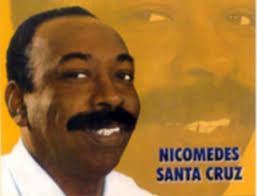|
The La Victoria District of Lima, Peru produced one of South America’s most important ambassadors of Afro-Peruvian culture. Nicomedes Santa Cruz Aparicio and Victoria Gamarra Ramirez produced ten children; the ninth of their ten children was Nicomedes Santa Cruz. After Santa Cruz completed elementary school he would go into the workforce, his first job was a locksmith then he worked as a blacksmith until 1956. During his free time Santa Cruz would write poems but in 1953 he would also open his own shop providing locksmith services. He would close his sop a few years later to give his time to revitalizing and preserving Afro-Peruvian culture. Santa Cruz would go about promoting his culture through his theater company he opened with his sister Victoria Santa Cruz; he would also use the Peruvian media to spread his message. His messages were spread through publications in newspapers such as Expreso and El Comercio; Santa Cruz’s push for the recognition of his history and culture came at a time when black people in Peru were treated as animals. Santa Cruz would record his first poetry album Nicomedes Santa Cruz y Su Conjunto Kumanana with his group Conjunto Cumanana in 1959. He would follow with the recording of his second poetry album Ingá and Décimas y poemas Afroperuanos in 1960. In 1964 he released a poetry album titled Cumanana Poemas y canciones, and in 1967 he recorded the poem “Benny ‘Kid’ Paret while attending the Canción Protesta Encuentro in Cuba. Santa Cruz was known as a pioneer in terms of using his craft to fight racism and injustice against the black people of Peru. His poetry, music, stories, publications and parties were his vehicles to empower his people. Santa Cruz realized that black historical figures were absent from history lessons; his own family wanted him to marry a woman who would help to “improve” the race, meaning a black woman was not good enough for Santa Cruz. An outspoken opponent of racism, Santa Cruz was viewed as a trouble maker for seeking to enlighten his people to their current conditions. In 1957 he made his theatrical debut in a show titled Black Rythems of Peru with the Pancho Fierro Company at the Teatro Municipal de Chile. Santa Cruz’s influence led to the creation of such events as the Black Arts Festival which was first held in 1971, an event Santa Cruz and others used to further promote Afro-Peruvian culture. He would become an ambassador for his culture around the world visiting Senegal, Cuba, Mexico, Panama, Columbia and Japan. In 1980 working as a journalist would take Santa Cruz to Madrid, Spain where he would live until 1992. His time in Madrid was spent recording a collection of songbook albums titled Espana en su Folklore, which was released in 1987. He taught a seminar on African culture in the Dominican Republic in 1989, followed by participating in the Expedition Adventure 92 Tour of Mexico and Central America. At the age of sixty-six Santa Cruz would die from lung cancer but his influence on his people and culture is still living today. He was influenced by Porfirio Vasquez and his work in Peru in the 1920’s, Vasquez was an early pioneer of the décima form of poetry used in Peru. A decima is a ten line poem of Spanish origin still used today. Santa Cruz is regarded as the most important black intellectual in twentieth century Peru; he gave his life and used his many talents to make sure black people in Peru knew their ancestral history. He made sure his people understood that they should experience justice and have the ability to improve their lives, and the lives of their family members. Even though he was a victim of racist attacks himself, Santa Cruz kept fighting for his peoples freedom. Nicomedes Santa Cruz, we proudly stand on your shoulders. J.A. Ward References:
http://www.blackpast.org/perspectives/nicomedes-santa-cruz-black-public-intellectual-twentieth-century-peru https://en.wikipedia.org/wiki/Nicomedes_Santa_Cruz https://www.discogs.com/Nicomedes-Santa-Cruz-Cumanana-Poemas-Y-Canciones/release/5747968 https://www.discogs.com/Nicomedes-Santa-Cruz-Decimas-Y-Poemas-Afro-Peruanos/release/2436984
0 Comments
Leave a Reply. |
Details
Categories
All
Click Here to join our mailing list
|
Contact Us: |
Connect With Us |
Site powered by PIT Web Design


 RSS Feed
RSS Feed



